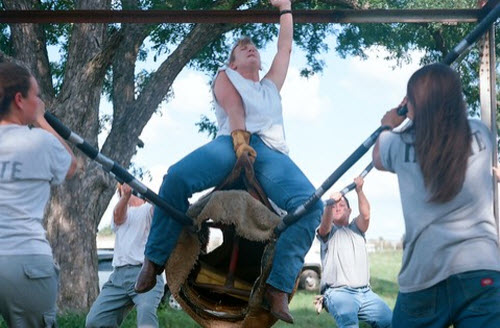Review: Sweethearts of the Prison Rodeo

The Great State of Oklahoma's female incarceration rate is the highest in the nation, and is more than twice the rate of any other state. This statistic says a lot about the state's conservative, law-and-order political climate. As Oklahoma State Senator Cal Hobson said, "Oklahoma leads America, and America leads the free world in incarceration."
This lock-'em-up mentality is the backdrop for Sweethearts of the Prison Rodeo, a powerful and bittersweet documentary about female inmates who compete in the 2007 Oklahoma State Penitentiary Rodeo. The film, opening today at Alamo Drafthouse on South Lamar, is at once an intimate portrait of prison life, a thrilling rodeo action film, and an astute sociological study of criminal justice in America.
From its stark opening shots of prison walls and handcuffed inmates dressed in rodeo cowboy garb, Sweethearts of the Prison Rodeo is a familiar look at life behind bars and yet a thoroughly original story about inmates who, to experience an unlikely sort of freedom, risk serious injury and even death. We've all seen prison documentaries with the standard mix of dreary cellblock cinematography and drearier inmate interviews, and there is some of this familiar territory in Sweethearts of the Prison Rodeo. Although the interviewees' life stories are very interesting, they're not new or surprising. What sets the film apart from other prison docs, however, is its sports drama-like, root-for-the-underdog storyline.
The underdogs in this case are the dozen or so women who compete in the rodeo, all inmates at the Eddie Warrior Correctional Center, a minimum-security women's prison in Taft, Oklahoma. The film's title is, of course, more than slightly ironic: Depending on your view of criminal behavior and its origins, these women may not be sweethearts at all. They're behind bars for everything from drug trafficking to second-degree murder and freely admit their sometimes violent misdeeds. On the other hand, they're also greatly sympathetic characters with horrifying, heartbreaking life stories. With nonexistent parents, deep emotional scars from childhood traumas and little education, it's little wonder they ended up where they are.
Competing against the women -- who weren't allowed to compete in the 70-year-old rodeo until 2006 -- is a motley crew of male prison rodeo veterans. Chief among them is Danny Liles, a colorful (and colorfully tattooed) convicted murderer who's been in the lockup since 1982 and appears often in the film. Liles and his male teammates are surprisingly welcoming of their female competitors, but don't expect them to be much of a challenge.
Sweethearts of the Prison Rodeo has two storylines, one following the inmates as they train for the rodeo, the other following them through the harsh, soul-numbing daily boredom of prison life and their attempts to be paroled. Both storylines, however, are skillfully intertwined and share a fundamental theme: the quest for freedom, whether it's on the back of a snorting, bucking bull or via a short, somewhat anticlimactic walk out the prison gates. The film explores this theme in scenes both thrilling and poignant, from bone-jarring rodeo footage reminiscent of films like 8 Seconds to quiet, reflective moments that reveal much about the inmates' world. As inmate Jamie Brooks says of her first rodeo tryout, "[It's] the first time ever in my life that I felt free."
As exciting as the rodeo sequences are, they're no more enthralling than the inmates' parole hearings, where the atmosphere is every bit as tense as in a rodeo arena. The inmates have about as much control over the parole boards as they do over the wildly gyrating bulls. And the stakes, of course, are far higher: Being thrown from a bull can mean a low score and maybe a broken bone -- but being denied parole can mean several more years behind bars. The film does such a great job of humanizing the inmates that we root for them in both situations.
Although Sweethearts of the Prison Rodeo evokes a lot of sympathy for its subjects, it wisely avoids prisoners-are-victims preaching. Director Bradley Beesley (Okie Noodling and Okie Noodling II) includes plenty of disturbing facts and statistics in the film, giving it definite political overtones. (For example, most female inmates in Oklahoma are incarcerated for minor drug-related crimes, and more than 80 percent of them are mothers.) But for the most part, Beesley just lets the inmates speak for themselves and leaves it up to the audience to decide what to make of their situations. They are highly articulate and self aware as they muse about their lives and families, but they don't condemn their captors, wallow in victimhood or beg for our forgiveness. They do, however, make us wonder about the wisdom of incarcerating them and inspire us to ask a lot of difficult questions about crime, punishment and justice in our society.
A deft combination of character study, thundering action, and political provocation, Sweethearts of the Prison Rodeo is in league with the best documentaries I've seen. And like the complex issues it addresses, it deserves the attention of a wide and perceptive audience.
Austin connections: Beesley lives in Austin. Among his many directorial projects is the A&E documentary series Rollergirls, about Austin's roller derby leagues. Sweethearts of the Prison Rodeo screened at SXSW in 2009.

